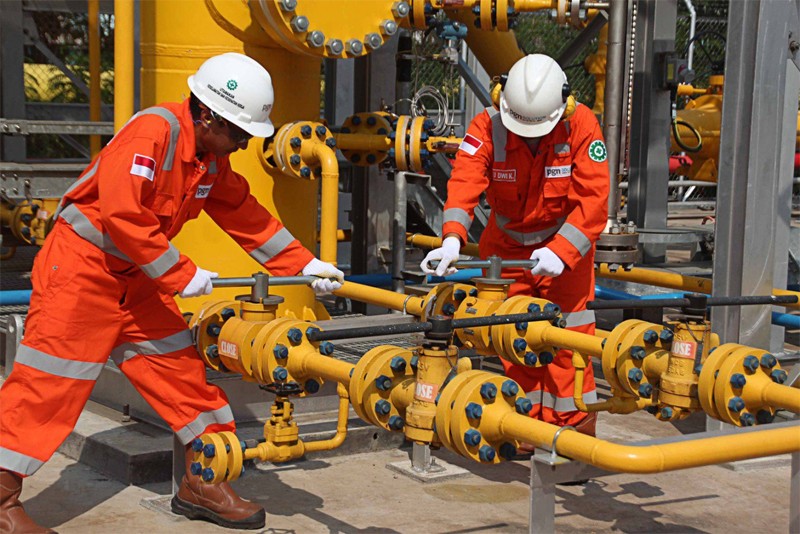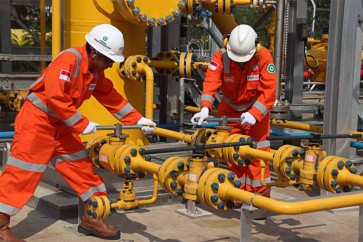Popular Reads
Top Results
Can't find what you're looking for?
View all search resultsPopular Reads
Top Results
Can't find what you're looking for?
View all search resultsEnergy Ministry picks DMO option to lower industrial gas prices
President Jokowi issued a regulation in 2016 that pledged to lower gas prices to $6 per MMBtu. The pledge was meant to boost the growth of seven gas-reliant industrial sectors namely electricity production, chemicals, food, ceramics, steel, fertilizers and glass manufacturing, which collectively consume about 80 percent of Indonesia’s gas supply.
Change text size
Gift Premium Articles
to Anyone
 Environmentally friendly – Two workers of state-owned gas company Perusahaan Gas Negara (PGN) check gas pipelines , which supply gas to electricity producer PT Indonesia Power at a gas meter station in Tambak Lorok, Semarang, Central Java. The company needs 116 million standard cubic feet per day (mmscfd) of natural gas per day. (JP/Suherdjoko)
Environmentally friendly – Two workers of state-owned gas company Perusahaan Gas Negara (PGN) check gas pipelines , which supply gas to electricity producer PT Indonesia Power at a gas meter station in Tambak Lorok, Semarang, Central Java. The company needs 116 million standard cubic feet per day (mmscfd) of natural gas per day. (JP/Suherdjoko)
T
he Energy and Mineral Resources Ministry has chosen to pursue a combination of a domestic market obligation (DMO) and fiscal incentives to reduce industrial gas prices in the hope of fulfilling a four-year-old promise from President Joko “Jokowi” Widodo.
The ministry will, among other requirements, expect oil and gas companies to prioritize selling their liquefied natural gas (LNG) to state-owned gas distributor PGN as part of efforts to bring the gas price down to US$6 per million British thermal units (mmbtu) as promised by the government, from between $8 and $9 per mmbtu at present.
“As long as PGN’s infrastructure runs at full capacity, it can sell at $6 per mmbtu,” said the ministry’s acting oil and gas director general Djoko Siswanto on Jan. 8.
Should PGN fail to bring gas prices down even with the higher LNG supply, then the government will reduce upstream costs – that average $5.4 mmbtu nationwide – by slashing non-tax state revenue (PNBP) from oil and gas companies, he added.
President Jokowi issued a regulation in 2016 that pledged to lower gas prices to $6 per MMBtu. The pledge was meant to boost the growth of seven gas-reliant industrial sectors namely electricity production, chemicals, food, ceramics, steel, fertilizers and glass manufacturing, which collectively consume about 80 percent of Indonesia’s gas supply.
Yet, four years after the regulation’s issuance, gas prices remain unchanged. During a Cabinet meeting on Jan. 6 Jokowi offered three solutions, including easing procedures to boost gas imports, the implementation of the DMO policy and the reduction or even the elimination of state revenue from gas sales.
Energy and Mineral Resources Minister Arifin Tasrif said on Jan. 9 that his office would not apply the option to increase imports because “if we import more gas, we will face another problem, which is the current account deficit. If the deficit widens, it will put pressure on the rupiah.”

















